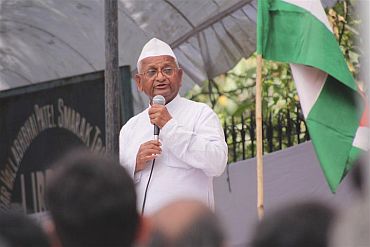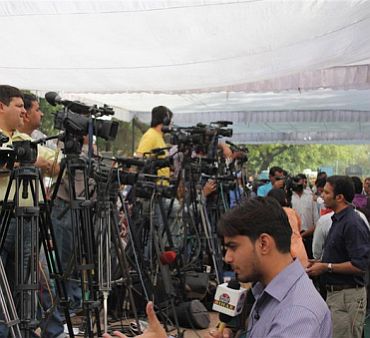
John DSouza, a veteran NGO worker, was waiting for a bus at Churchgate station in Mumbai last week when an unusual motorcade came roaring down the road.
At the front were about 25 motorbikes, with riders holding aloft India's national flag. They were being followed by an equal number of small and large cars and some people on foot distributing pamphlets asking people to fight against corruption.
From his vantage point in the serpentine queue DSouza shouted that spending so much petrol was also a form of 'corruption'. One of the protestors in the motorcade snapped back: "Khud ke paise se gaadi chalaata hoon" (I'm running the car with money I earned myself).
But many fellow commuters in that bus queue supported DSouza.
Even as the celebration was over the fast-tracking of the Lokpal Bill continues some dark challenges are moving to the foreground.
Is the outrage over corruption going to extend to introspection among different sections of society about widespread complicity in a culture of bribes and 'cuts'? Or will the focus remain external and primarily on politicians?
. . .

Can passionate participation by citizens extend to a more sustained, nuts and bolts, engagement with making democracy work for all? Or is the mobilisation against corruption going to be limited to concerns of the middle class?
For instance, about 500 adivasis recently walked all the way from Palghar to Mumbai -- a distance of about 150 kms -- to appeal for their basic rights. "This news was not even mentioned in a single English daily or 24 hours news bulletin" says DSouza, who is director of the Centre for Education and Documentation in Colaba in south Mumbai.
"This too is corruption. Corruption of our concept of news, entertainment, and justification of our choices based on how much revenue it gets for our channels" adds DSouza.
A striving for deeper and truly more representative democracy is a far more ambitious undertaking than fighting corruption -- be it theft from the public exchequer or a kickbacks culture in the private sector.
It is not clear whether the upsurge which Anna Hazare's fast galvanized will turn into a more sustained energy for change.
But those who wish to work for a serious transformation, shifting Indian political culture towards a more holistic sense of social equity and justice, could either join or learn from a wide variety of long-standing endeavours.
. . .

Here are some examples:
The Lok Satta Party founded in 2006 may have originated in Andhra Pradesh but it now has supporters and workers in different parts of India. It was significant that Lok Satta's President Dr Jayaprakash Narayan, a former officer of the Indian Administrative Service, last week issued a special appeal asking people not to demonise politics and politicians in the process of fighting corruption.
Dr Narayan welcomed the fact that Anna Hazare's campaign succeeded in galvanizing a large section of people who otherwise 'remained indifferent to the day-to-day functioning of democracy, corruption, banality and decadence in public life'.
But, cautioned Dr Narayan, there are no quick fixes and a piece of legislation or a novel institution cannot undo all the damage done to democracy over decades. "Dubbing people in politics as bad by definition and those outside as good is both fallacious and anti-democratic" said a statement by the Lok Satta Party.
This view would be endorsed by the Association for Democratic Reforms, an organisation founded by a group of professors at the Indian Institute of Management Ahmedabad in 1999. Since then ADR has done pioneering work to enable voters to 'know your neta'.
In every election campaign ADR collects and publishes information about criminal records of election candidates. It also asks all candidates to issue a statement about their total assets.
Last week ADR issued a press release on the analysis of asset increases of re-contesting candidates in the upcoming Tamil Nadu Assembly Elections. Re-contesting MLAs have been found, on an average, to have a 195 per cent growth in assets since the last election.
. . .

Then there are non-party political platforms like the National Alliance of People's Movements which has been fighting for the rights of India's most underprivileged sections over the last two decades.
Like Lok Satta the NAPM whole heartedly supported the protest at Jantar Mantar last week, but added that there is an urgent need for wider political reforms.
The NAPM has called for repeal of legislations like SEZ Act, Land Acquisition Act and other laws which are depriving people of their lands and livelihoods as well as facilitating corruption.
It demands greater transparency and accountability not only from elected representatives but also private companies which wield enormous power.
In a statement issued last week the NAPM said: "We believe the energy generated from this (anti-corruption) agitation needs to be channelized and onus lies on the secular and democratic political forces of the country to mobilise it for a larger political reform in the country. Our movements have to beware of the communal forces and rabid nationalism in the name of the struggle and such tendencies need to be condemned."
It remains to be seen how NAPM will respond to Anna Hazare's statement, on April 10, in praise of Gujarat Chief Minister Narendra Modi and Bihar Chief Minister Nitish Kumar as role models.
While saying that he does not support communalism or riots Hazare was reported to have said that he appreciates Modi for decentralisation of power.
. . .

Here is a dark lining to the otherwise bright cloud of citizen mobilization. How many of the people in that anti-corruption motorcade in South Mumbai last week would acknowledge the 2002 communal carnage in Gujarat and subsequent lapses of the state's bureaucracy and judicial system as both a failure of Indian democracy and a serious miscarriage of justice?
From corporate chiefs to political leaders of some parties as well as ordinary citizens -- there has been ample evidence of the view that since Gujarat under Modi is a well-administered state, with seemingly lower prevalence of corruption, the carnage of 2002 should be forgotten or ignored.
But democracy cannot survive if even a segment of citizens believe that as long as there is efficient administration that ensures economic growth -- violations of the fundamental right to life can from time to time be overlooked.
This is the kind of conundrum that grassroots organisations like Mazdoor Kisan Shakti Sangathan in Rajasthan are grappling with. It must be noted that though the MKSS is a pioneer of the Right to Information movement and other methods of countering corruption at the village level -- its activists stayed in the background during the recent protests.
They are busy preparing for the inauguration of a School for Democracy, an idea that has been quietly nurtured for some years and has now taken the shape of an institution in Rajsamand District of Rajasthan.
The School for Democracy is meant to be a training ground for ordinary citizens as well as full-time social activists to device ways of facilitating holistic engagement with social justice and democratic participation.
The future of our democracy, and the long hard struggle to demolish our pervasive culture of corruption, probably depend on the creation and success of many such institutions.